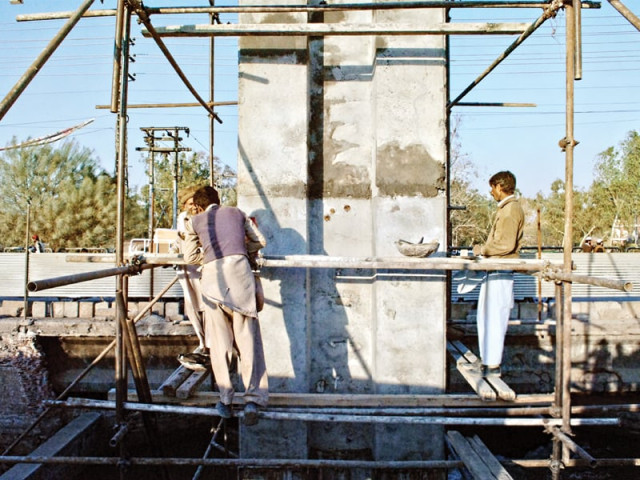Labour conditions: Workers build flyover without safety net
Labourers not given safety equipment as stated in EIA report.

Faheem was taken to the hospital by Qurban Ali, whose job is to give first aid to injured labourers at the site. Faheem’s was one of three serious accidents there since construction work began in October 2011, says Ali. He estimates that he has treated about 500 minor injuries each month. There are about 400 workers at the site during the day, and 60-100 at work at night.
The environment impact assessment (EIA) report for the Muslim Town flyover says special arrangements will be made to ensure worker safety, but when this correspondent visited the site, no discernible safety measures were evident. The labourers complained that their safety was a low priority, while a supervisor insisted that quick work was far more important than their safety.
Sand in my eyes
Labourer Belal, 21, says that the workers have not been given necessary equipment such as goggles, gloves, boots or jackets. Belal, a steel binder, says he injures his hands or feet almost every day. His friend, another welder, broke his arm on the job, while another suffered a serious eye inflammation. “They were not paid for their treatment. One had to sell his cell phone,” he says.
Imran Mazhar, 20, says goggles are an absolute necessity because of the high dust levels. “We have to go to a clinic or the dispenser daily to get sand fleas removed from our eyes. Those over the age of 40 are usually coughing or have a sore throat because of the dust,” he said.
Abbas, who operates an excavator, was hit by a car while working by the side of the Canal a few months ago. “I injured my leg and no one was around to stop the driver of the car, so he fled,” he says. Some labourers tied a white cloth around his leg and he went straight back to work. He said that of the many construction sites he had worked at, “this one cares and provides for workers the least”.
Many labourers also complained that they had not been paid since November.
EIA
The EIA report for the Muslim Town flyover says the workers will be provided equipment to protect themselves while undertaking excavating, welding and piling tasks.
Brigadier Shahid Majeed, the NLC supervisor at the site, said worker safety was not as important as ensuring that the flyover is completed on schedule, by March 23. “Under the time pressure, this is the best that we can do,” he said.
He said that seven officials had been assigned the task of distributing the work load among the workers. He refused to comment on the labourers’ claim that they had not been paid since November.
Project Director Sabir Khan of the Communications and Works Department said that the workers were provided safety kits, but they chose not to wear them. “They consider helmets, gloves and boots as a hindrance to working comfortably. We cannot force them to wear the equipment,” he said.
He said that the department had pressed the National Logistics Cell (NLC), the construction contractor for the project, to ensure worker safety.
A National Engineering Service of Pakistan (NESPAK) official said its job was to provide technical assistance, not educate labourers about safety.
Niaz Khan of the National Trade Unions Federation says no exact count of injuries or casualties in accidents at construction sites has ever been reported.
He said the ban on labour inspections in Punjab since 2003 had allowed employers and factory owners to ignore worker safety. He said he hoped that worker safety would now be taken more seriously, particularly in light of the factory collapse on Multan Road last Monday in which dozens of labourers, including women and children, were killed.
Published in The Express Tribune, February 13th, 2012.


















COMMENTS
Comments are moderated and generally will be posted if they are on-topic and not abusive.
For more information, please see our Comments FAQ